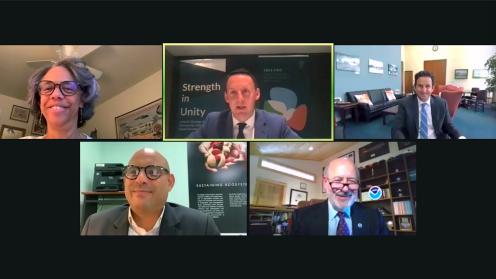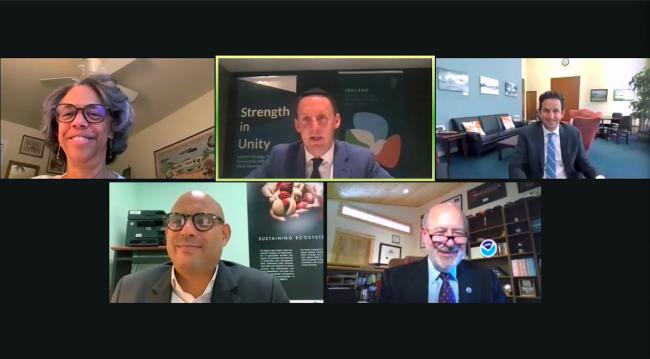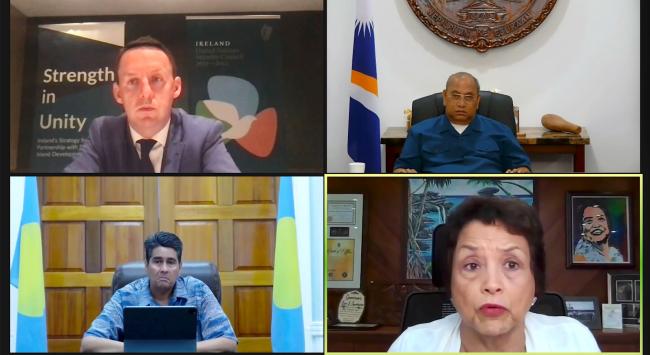This event built on a series of webinars convened by the Local2030 Islands Network throughout 2020 to share island solutions, experiences, and approaches in building back better in the context of COVID-19. It was co-organized by the Permanent Mission of Ireland to the UN, with the US, the Federated States of Micronesia, Hawaii Local2030 Hub, Global Island Partnership, Curaçao, the UN Foundation, shift7 (an American NGO), and Guam. It was hosted by the Government of Ireland on behalf of the Network.
Brian Flynn, Deputy Permanent Representative of Ireland to the UN, moderated the event, saying the Network, inter alia, gives islands a global voice to increase momentum toward achieving the SDGs.
Colm Brophy, Minister for Overseas Development Aid and Diaspora, Ireland, via video, commended the response of islands to COVID-19, drawing on the ingenuity, resilience, and sense of community that enable islands to survive. He stressed the Network’s principles of supporting: local projects; local implementation; peer-to-peer learning; and communities of practice across the Network.
Simon Coveney, Minister for Foreign Affairs, Ireland, said Irish aid is assisting coastal communities in least developed countries and small island developing states (SIDS) and supporting adaptation and resilience in coastal areas.
Panel I: Micronesia Challenge Leaders Discuss Challenges and Opportunities
David Panuelo, President of the Federated States of Micronesia, via video, said COVID-19 has exacerbated the impacts of climate change on the most vulnerable. He cautioned against using the pandemic as an excuse for not implementing the Paris Agreement, calling for collaboration for a green recovery. He noted his country had recently joined the Network.
Christopher Loeak, Acting President and Minister, Marshall Islands, said the priority for the Marshall Islands is collective development indicators and monitoring instruments, noting his country’s upcoming submission of its first Voluntary National Review on progress toward the SDGs.
Surangel Whipps, Jr., President of Palau, stressed exchange on experiences of catastrophic situations and expressed hope that islands’ cultural practices and traditional knowledge will sustain them. Noting Palau’s reliance on visitors’ fees for financing conservation, he lamented COVID-19’s impacts on tourism, and called for economic diversification and food security.
Lourdes “Lou” Leon Guerrero, Governor of Guam, said Guam has developed an action plan to achieve a sustainable future that includes tracking progress and promoting behavior changes in response to climate change. She cited work toward a circular economy, increasing agri- and aquaculture, and a 100% renewable energy future.
During a question-and-answer session, Loeak said the Network helps members share information and lessons learned, make commitments, and obtain the tools needed for their implementation.
Whipps said islands are experiencing rising sea levels, wildfires, and extreme weather, and that Palau’s efforts to adapt and increase resilience provides lessons for the world. He announced Palau will host the Seventh Our Ocean Conference in person in 2022.
Guerrero noted that although the world is big, islands have a small global community that can work together in the Network to garner strength and learn from each other. She said COVID-19 shows the importance of sustaining communities and behaviors that protect lives. She called for islands to continue working together for sustainable economies and sustainable sources of food and energy for future generations.
Panel II: Discussion on Island Potential and Resiliency in the Face of COVID-19 and Climate Change
Simon Stiell, Minister for Climate Resilience, the Environment, Forestry, Fisheries, Disaster Management and Information, Grenada, said the Caribbean Community is working together to learn, share, and build on what we know works.
Richard Spinrad, Under Secretary of Commerce for Oceans and Atmosphere and Administrator, National Oceanic and Atmospheric Administration (NOAA), US, cited his country’s programmes, products, and services for climate action, including nature-based solutions, which it hopes to share. He stressed recognizing cultural frameworks and sensitivities.
Brian Schatz, US Senator for Hawai‘i, said Hawai’i has 36% clean energy, with a goal of reaching 100% by 2045. He said Hawai’i’s aspiration of providing a model for the world is becoming a reality. He noted the Network’s dashboard enables others to learn, including about native wisdom, so lessons can be replicated.
Senior Official Marcia Bernicat, Office of the Under Secretary for Economic Growth, Energy and the Environment, US, said islands are reducing risk, building resilience, and decarbonizing. She said the US is providing adaptation support and technical assistance to help countries achieve the SDGs and to support the Network, including on renewable energy.
During the question-and-answer session, Stiell said SIDS can go from being victims to being exemplars of resilience. Noting small islands can respond faster than larger countries, he called on islands to collectively demonstrate how to turn adversity into something positive. However, he added that support from the international community is critical for success.
Spinrad said islands can educate everyone on the economic costs of ocean resource loss. He called for: rigorous analytical processes for determining priorities; collection of harmonized data; and data sharing. He noted disconnects between scientists and communities, saying solutions must be co-developed with all stakeholders for progress to be made and commending the Network in this regard.
Schatz said working on all potential environmental solutions is the best political pathway for meeting the SDG targets. He noted Hawai’i proves that more than 15-20% of the grid can be powered by renewables. He stressed that US climate action will be a decades-long enterprise.
Bernicat noted the Network’s communities of practice can bring together key public and private stakeholders to advance, inter alia: planning priorities; peer-to-peer collaboration; resource sharing; and technical assistance. She noted islands have long been leaders in advocating for change.
In closing, Flynn noted the role islands play in leading on climate and sustainability solutions and on shifting behavior to meet the 2030 Agenda for Sustainable Development and its SDGs.
Contact:
Laura Kam <laura@hawaiigreengrowth.org>









